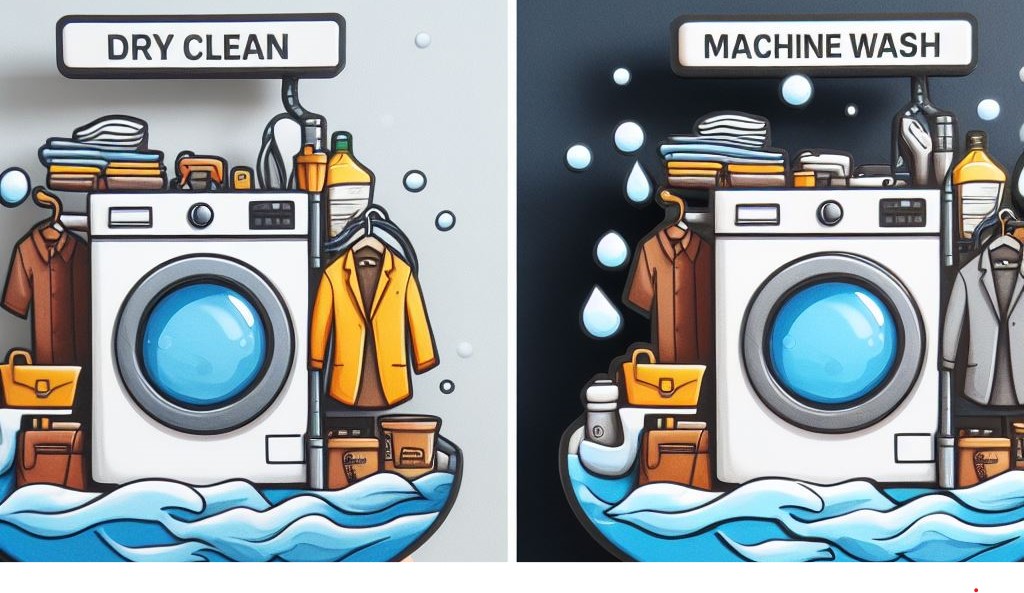Washing machines typically use water for cleaning clothes, while dry cleaning involves chemical solvents. The latter is gentler on delicate fabrics and prevents shrinkage.
Choosing between a washing machine and dry cleaning is essential for the longevity and appearance of your garments. Washing machines work well for everyday clothes, employing water and detergent to remove dirt and stains. On the other hand, dry cleaning is a specialized process without water, using solvents to clean sensitive fabrics like silk, wool, and suits that can degrade in water.
It’s essential for items that need gentle treatment or have stubborn stains that water-based cleaning can’t tackle. The choice hinges on fabric type, garment care labels, and the nature of stains – factors that should guide your decision to ensure your clothing remains in pristine condition.

Credit: fcdrycleaners.com
Table of Contents
Washing Machine Vs Dry Cleaning
Aspect | Washing Machine | Dry Cleaning |
|---|---|---|
Fabric Care | Suitable for everyday clothes. | Ideal for delicate or special fabrics. |
Convenience | Convenient for regular use at home. | Requires dropping off and picking up garments. |
Cost | Economical for regular laundry. | Can be more expensive for individual items. |
Time Efficiency | Quick and efficient for small loads. | May take longer due to drop-off/pick-up process. |
Quality | May not preserve delicate fabrics as well. | Ensures meticulous care, preserving quality. |
The Basics Of Laundry Cleaning
Keeping clothes clean is a daily task. Two main methods help us do this job: traditional washing and dry cleaning. Each has its way of removing dirt and stains.
Traditional Washing Machines
Water and detergent tackle dirt in washing machines. They come in two types:
- Top-loading: Clothes go inside from the top.
- Front-loading: Clothes get loaded from the front.
Cycle options vary for different fabrics. The basic steps are:
- Fill with water
- Add detergent
- Agitate to clean
- Rinse
- Spin to dry
Washing machines handle most clothing types. They use energy and water. Regular maintenance keeps them in good shape.
The Dry Cleaning Process
Dry cleaning uses chemicals to clean. Clothes do not get wet in water.
The steps include:
- Inspect for stains
- Pre-treat stains
- Clean with solvent
- Extract solvent
- Press to remove wrinkles
It’s ideal for delicate fabrics. The process protects materials that water might damage.
Always check the care label before cleaning. Some clothes require professional handling.

Credit: www.drycleaning.com.sg
Fabrics And Their Care
Clothes need love, just like us! Some like a splash in the wash; others need a special clean. Pick the right clean and your clothes will thank you. Let’s explore what goes where!
Materials Suited For Washing Machines
Cotton, linen, and durable synthetics love the washing machine. Here’s the scoop:
- Cotton: Breathes easy, washes well.
- Linen: Keep cool, goes in the wash.
- Polyester: Strong and machine ready.
Use cold water and separate colors to keep them bright and happy.
Items Best Handled By Dry Cleaning
Some clothes are too fancy for the wash. They need a gentle, dry care. Let’s see:
Fabric | Reason for Dry Cleaning |
|---|---|
Silk | Needs a soft touch, no water please. |
Wool | Stays soft and shapely with dry clean. |
Suede & Leather | Loves expert care to stay luxe. |
Remember, check the tag! It knows best for fabric care.
Environmental Impact
Choosing between washing machines and dry cleaning is not just about your clothes. It affects our Earth too. Let’s dive into how each method impacts the environment.
Water Usage And Pollution
The way we clean clothes uses water and can cause pollution. Washing machines need lots of water. Older models use up to 40 gallons per load. Newer, efficient models cut this in half but it’s still a lot. The water mixed with detergents can harm the environment if not treated well. Green detergents are better as they create less pollution.
Washing Machine Type | Average Water Usage Per Load |
|---|---|
Older Models | 40 Gallons |
Efficient Models | 20 Gallons |
Chemicals In Dry Cleaning
Dry cleaning often uses chemicals to clean clothes without water. One common chemical is perchloroethylene or “perc”. Perc can be bad for our health and the environment. Today, eco-friendly dry cleaners are using safer chemicals. They help protect our planet.
- Perc (Perchloroethylene): Common but harmful
- Hydrocarbons: Less toxic alternatives
- Liquid Silicone: A green chemical option
Cost And Convenience Factors
When deciding between a washing machine and dry cleaning, cost and convenience play a big part. Some people like saving money doing laundry at home. Other people prefer the ease of dropping clothes off for cleaning.
Comparing Expenses
Washing machines can be cost-effective but remember the upfront price. Also, energy, water, and detergent add to the bill. Over time, these costs can build up. Still, they often beat the steady prices of dry cleaning.
On the other hand, dry cleaning is a consistent expense.
Cost Factor | Washing Machine | Dry Cleaning |
|---|---|---|
Initial Investment | High | None |
Regular Costs | Medium (Energy, Water, Soap) | High (Per Item) |
Accessibility Of Services
The availability of washing machines and dry cleaners varies. In cities, dry cleaners are common and close by.
Washing machines can be in your home, making them super handy. Laundromats are a go-to if there’s no machine at home.
- Home Washing: Always ready, great for multi-taskers.
- Laundromats: Wider availability, extra travel needed.
- Dry Cleaners: Professional service, may not be nearby.
Longevity And Quality Of Garment Life
Understanding how to care for clothes properly ensures they last longer and stay in great condition. The debate between washing machines and dry cleaning is not just about removing stains. It’s also about the impact on a garment’s life span. Let’s delve into the effects each method has on the longevity and quality of your favorite outfits.
Effects On Fabric Texture And Color
Choosing the right cleaning method is crucial for maintaining fabric texture and color. Washing machines may cause fading and pilling over time. Colors can run and fabrics can stretch if the wrong settings are used. In contrast, dry cleaning uses solvents that are gentler on clothes.
- Dry cleaning: Preserves vibrancy and prevents shrinkage.
- Washing: May lead to color bleeding, especially in warm water.
Wear And Tear: Washing Vs. Dry Cleaning
Washing Machine | Dry Cleaning |
|---|---|
Agitation can wear fabrics down. | Less agitation keeps fibers intact. |
Heat may cause shrinkage. | Cooler temperatures protect shape. |
Detergents can weaken fibers. | Chemicals are designed to be fabric-safe. |
Dry cleaning tends to be easier on clothing. It often extends the life of garments, especially delicate items or those with special care instructions. Regular washing can cause abrasion and stress to fabric fibers, but dry cleaning’s non-aqueous environment reduces these risks.
Making The Right Choice
Choosing between using your washing machine and opting for dry cleaning is vital. Each method works best for different types of clothes and situations. Discover the best way to handle your laundry for ultimate care and longevity.
Assessing Your Laundry Needs
Start by looking at fabric tags. They guide you on washing and drying. Consider fabric type, color, and delicacy. Your lifestyle also matters. Busy schedules might mean you prefer quick, in-home washing. Yet, some garments demand the professional touch of dry cleaning.
- Washing Machine: Great for everyday clothes.
- Dry Cleaning: Ideal for delicate, embellished, or tailored pieces.
When To Switch Between Methods
Understand the signs for switching methods. Tough stains and odors may require dry cleaning. Regular washables suit the washing machine. Switching depends on clothing care labels and the outcome you desire.
Material | Washing Machine | Dry Cleaning |
|---|---|---|
Cotton | Yes, if colorfast | For deep stains |
Silk | Rarely, on gentle cycle | Preferred method |
Wool | Occasionally, with care | To maintain shape |
- Check Labels: Always read care labels.
- Stain Evaluation: Choose dry cleaning for persistent stains.
- Seasonal Swap: Dry clean before storing seasonal clothing.
FAQ
Which Is Better: Washing Machine Or Dry Cleaning?
Washing machines are best for everyday clothes due to convenience and lower cost. Dry cleaning is ideal for delicate fabrics and deep stains, offering a professional clean without water.
Can Dry Cleaning Damage Clothes Over Time?
Dry cleaning uses chemicals that can wear down fibers with repeated use. However, it’s less abrasive than water-based cleaning for certain fabrics, ensuring longevity if used appropriately.
What Items Should Not Be Machine Washed?
Items with embellishments, delicate fabrics like silk or wool, and structured garments like suits should avoid machine washing. Consult care labels for best practices.
How Often Should Clothes Be Dry Cleaned?
Dry clean garments sparingly, reserving it for stains, odors, or annually for seldom-worn items. Regular wear typically doesn’t require frequent dry cleaning.
Bottom Line
So, which is better between washing machine and dry cleaning? Deciding between using a washing machine or opting for dry cleaning isn’t always straightforward. Your choice hinges on fabric type, convenience, and garment care preferences. Meet the former for everyday items, but trust the latter with your delicate and high-maintenance pieces.



